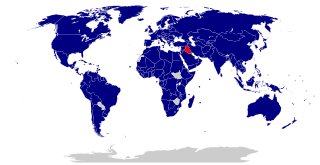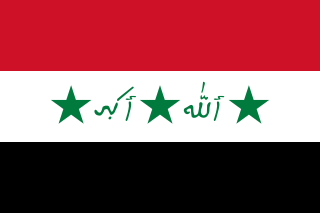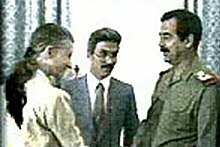
Iraq is a country in Western Asia that largely corresponds with the territory of ancient Mesopotamia. The history of Mesopotamia extends from the Lower Paleolithic period until the establishment of the Caliphate in the late 7th century AD, after which the region came to be known as Iraq. Encompassed within Iraqi territory is the ancient land of Sumer, which came into being between 6000 and 5000 BC during the Neolithic Ubaid period of Mesopotamian history, and is widely considered the oldest civilization in recorded history. It is also the historic center of the Akkadian, Neo-Sumerian, Babylonian, Neo-Assyrian, and Neo-Babylonian empires, a succession of local ruling dynasties that reigned over Mesopotamia and various other regions of the Ancient Near East during the Bronze and Iron Ages.

Since 1980, the foreign relations of Iraq have been influenced by a number of controversial decisions by the Saddam Hussein administration. Hussein had good relations with the Soviet Union and a number of western countries such as France and Germany, who provided him with advanced weapons systems. He also developed a tenuous relation with the United States, who supported him during the Iran–Iraq War. However, the Invasion of Kuwait that triggered the Gulf War brutally changed Iraq's relations with the Arab World and the West. Egypt, Saudi Arabia, Syria and others were among the countries that supported Kuwait in the UN coalition. After the Hussein administration was toppled by the 2003 U.S. invasion, the governments that succeeded it have now tried to establish relations with various nations.

Saddam Hussein was an Iraqi politician and revolutionary who was the fifth president of Iraq, from 16 July 1979 until 9 April 2003. He also served as prime minister of Iraq, first from 16 July 1979 until 23 March 1991, and later from 29 May 1994 to 9 April 2003. He was a leading member of the revolutionary Arab Socialist Ba'ath Party, and later, the Baghdad-based Ba'ath Party and its regional organization, the Iraqi Ba'ath Party, which espoused Ba'athism, a mix of Arab nationalism and Arab socialism.

April Catherine Glaspie is an American former diplomat and senior member of the Foreign Service, best known for her role in the events leading up to the Gulf War.

An insurgency began in Iraq after the 2003 U.S.-led invasion, and lasted throughout the ensuing Iraq War which lasted from 2003 until 2011. The first phase of the insurgency began shortly after the 2003 invasion and before the establishment of the new Iraqi government. From around 2004 to May 2007, Iraqi insurgents primarily targeted the American-led coalition forces, and later also targeted Iraqi security forces.
The following lists events in the year 2003 in Iraq.

The Iraqi invasion of Kuwait was an operation conducted by Iraq on 2 August 1990, whereby it invaded the neighboring State of Kuwait, consequently resulting in a seven-month-long Iraqi military occupation of the country. The invasion and Iraq's subsequent refusal to withdraw from Kuwait by a deadline mandated by the United Nations led to a direct military intervention by a United Nations-authorized coalition of forces led by the United States. These events came to be known as the first Gulf War, eventually resulting in the forced expulsion of Iraqi troops from Kuwait and the Iraqis setting 600 Kuwaiti oil wells on fire during their retreat, as a scorched earth strategy.

The trial of Saddam Hussein was the trial of the deposed President of Iraq Saddam Hussein by the Iraqi Interim Government for crimes against humanity during his time in office.
The Iraqi National Dialogue Council is a Sunni Islamist political party initially established as an umbrella organization of approximately ten smaller Sunni parties to take part in the 2005 Iraqi Constitution drafting process. The party was founded by Saleh al-Mutlaq and Khalaf al-Ulayyan. During the Iraqi Constitution drafting negotiations in 2005, the party was advised by Sadoun al-Zubaydi, an Iraqi foreign policy expert and former personal translator to Saddam Hussein. In the lead-up to the December 2005 elections, Mutlaq left the National Dialogue Council and formed his own party and gave it a similar name: the Iraqi National Dialogue Front. 'Ulayan now leads the party, which is the smallest of three parties that compose the Iraqi Accord Front (Tawafuq) coalition. The parties which compose the organisation originate from Iraq's wider Arab populated region.

Iraq–Saudi relations are the bilateral and diplomatic relations between the Republic of Iraq and the Kingdom of Saudi Arabia.

Iraq–Syria relations are the bilateral relations/diplomatic relations between the Sovereign states of Iraq and Syria. Since both nations are neighbours, they share the Iraq–Syria border. Relations are marked by long-shared cultural and political links, as well as former regional rivalry. The two countries took their present form after the Sykes–Picot Agreement to dismember the Ottoman Empire into British and French spheres of influence after World War I.

Egypt–Iraq relations are foreign relations between Egypt and Iraq. Iraq's relations with the Arab world have been extremely varied. The relationship between Iraq and Egypt soured in 1977 when the two nations broke relations with each other following Egypt's peace accords with Israel. In 1978, Baghdad hosted an Arab League summit that condemned and ostracized Egypt for accepting the Camp David accords. However, Egypt's strong material and diplomatic support for Iraq in its war with Iran led to warmer relations and numerous contacts between senior officials, despite the continued absence of ambassadorial-level representation. Since 1983, Iraq has repeatedly called for the restoration of Egypt's "natural role" among Arab countries. In January 1984, Iraq successfully led Arab efforts within the OIC to restore Egypt's membership.

After World War I, Iraq passed from the failing Ottoman Empire to British control. Kingdom of Iraq was established under the British Mandate in 1932. In the 14 July Revolution of 1958, the king was deposed and the Republic of Iraq was declared. In 1963, the Ba'ath Party staged a coup d'état and was in turn toppled by another coup in the same year, but managed to retake power in 1968. Saddam Hussein took power in 1979 and ruled Iraq for the remainder of the century, during the Iran–Iraq War of the 1980s, the Invasion of Kuwait and the Gulf War of 1990 to 1991 and the UN sanction during the 1990s. Saddam was removed from power in the 2003 invasion of Iraq.

Ba'athist Iraq, formally the Iraqi Republic until 6 January 1992 and the Republic of Iraq thereafter, covers the national history of Iraq between 1968 and 2003 under the rule of the Arab Socialist Ba'ath Party. This period began with high economic growth and soaring prosperity, but ended with Iraq facing social, political, and economic stagnation. The average annual income decreased both because of external factors such as the heavy sanctions placed on Iraq by Western countries and the internal policies of the Iraqi government.

Iraqi nationalism is a form of nationalism which asserts the belief that Iraqis are a nation and promotes the cultural unity of Iraqis of different ethnoreligious groups such as Mesopotamian Arabs, Kurds, Turkmens, Assyrians, Chaldeans, Yazidis, Mandeans, Shabaks, Yarsans, and others. Iraqi nationalism involves the recognition of an Iraqi identity stemming from ancient Mesopotamia including its civilizations and empires of Sumer, Akkad, Babylon and Assyria. Iraqi nationalism influenced Iraq's movement for independence from Ottoman and British occupation. Iraqi nationalism was an important factor in the 1920 Revolution against British occupation, and the 1958 Revolution against the British-installed Hashemite monarchy.
The Umm al-Qura Mosque is a mosque located in Baghdad, Iraq. It was the city's largest place of worship for Sunni Muslims, but it has also become the location of a Shia hawza and a place of refuge for many fleeing the terrorists' depredations in the Anbar Province. Originally called the Umm al-Ma'arik mosque, it was designed to commemorate Saddam Hussein's self-proclaimed victory in the 1991 Gulf War and was intended to serve as a personal tribute to Saddam himself. It is located in the Sunni-populated al-Adel area of western Baghdad. Costing US$7.5 million to build, the mosque's cornerstone was laid on Saddam's 61st birthday on 28 April 1998. It was formally completed on 28 April 2001 in time for the ten-year anniversary of the Gulf War.

The relations between Iraq and Kuwait are longstanding and complex, experiencing many changes throughout recent decades.

Ra'ad Majid Rashid al-Hamdani is a former General of the Iraqi Republican Guard, and was one of Saddam Hussein's favourite officers.
The timeline of the Gulf War details the dates of the major events of the 1990–1991 war. It began with the Iraqi invasion of Kuwait on 2 August 1990 and ended with the Liberation of Kuwait by Coalition forces. Iraq subsequently agreed to the United Nations' demands on 28 February 1991. The ground war officially concluded with the signing of the armistice on 11 April 1991. However, the official end to Operation Desert Storm did not occur until sometime between 1996 - 1998. Major events in the aftermath include anti-Saddam Hussein uprisings in Iraq, massacres against the Kurds by the regime, Iraq formally recognizing the sovereignty of Kuwait in 1994, and eventually ending its cooperation with the United Nations Special Commission in 1998.

The bilateral relationship between Jordan and Kuwait is considered to be strong, though there are still sporadic tensions. Jordan hosts an embassy in Kuwait City, and Kuwait hosts an embassy in Amman.
















